TL;DR
- Build functional web apps in minutes with AI, no coding required
- AI handles requirements, code generation, testing, and deployment
- Comparison of top tools with pricing, features, and target users
- Benefits: faster launches, lower costs, scalable and customizable apps
Fact Box
Imagine creating a fully functional web app in minutes, without writing a single line of code.
Are you tired of spending countless hours coding your web applications? Is there a faster, more efficient way to develop robust business software? Have you ever wondered how AI can revolutionize my web app development process? These are the questions that plague many developers and business owners today. Elon Musk once said, “AI is the future, not just for humanity, but for all fields of work.”
The struggle to streamline web app development is real, costing businesses time and money. A study by McKinsey highlights the inefficiencies in traditional software development processes, emphasizing the urgent need for innovative solutions. Moreover, Harvard Business Review has documented how improving software development efficiency can lead to significant business gains.
Why trust me? I specialize in AI-driven software development solutions. With over a decade of experience in the field, I have explored numerous organizations’ transitions from manual coding to AI-assisted development, increasing their productivity and profitability.
By reading this article, you will understand how AI web app generators can transform your development process, saving you time and resources. You will learn about the key features of these tools, how they work, and the tangible benefits they offer for your business. Get ready to revolutionize the way you create web applications.
The Problem: Inefficiencies in Traditional Web App Development
In the world of web development, inefficiencies are common and can significantly impact a business’s time and resources. Here are the key challenges faced by traditional web app development:
- Time-Consuming Process
- Developing a robust web app can take several months from planning to deployment.
- Delayed time-to-market increases the risk of falling behind competitors.
- Companies that streamline their software development processes can bring products to market up to 50% faster, according to a McKinsey study.
- Resource-Intensive
- Requires significant investment in skilled developers, designers, and project managers.
- Large teams are needed, leading to potential communication breakdowns and project delays.
- Maintaining a team of highly skilled professionals is costly and the demand often exceeds supply.
- Scalability Issues
- Traditional development methods struggle with scaling to handle increased traffic and data loads.
- Performance bottlenecks and poor user experiences are common.
- Making an app scalable post-development requires substantial rework and investment.
- Ongoing Maintenance
- Continuous maintenance is needed to fix bugs, patch security vulnerabilities, and update features.
- Additional resources are required for ongoing upkeep, diverting attention from new projects and innovation.
- According to Harvard Business Review, inefficiencies drain financial resources and stifle creativity and strategic initiatives.
- Lack of Flexibility
- Adapting traditional web apps to changing business requirements is cumbersome.
- Conventional coding frameworks require significant rewrites for even small changes.
- This rigidity delays projects and increases costs.

These challenges underscore the need for innovative solutions that streamline development, reduce costs, and enhance scalability and maintenance. AI web app generators, that are enabling businesses to develop high-quality web applications more efficiently and cost-effectively.
The Solution: AI Web App Generators
To address the inefficiencies plaguing traditional web app development, AI web app generators have emerged as a revolutionary solution. These tools leverage artificial intelligence to automate and streamline the entire development process, offering numerous benefits that traditional methods simply cannot match.
What is an AI AI Web App Generator?
An AI web AI app generator is a tool that uses artificial intelligence to create web applications automatically. By understanding the user’s requirements, these generators can produce functional web apps without the need for manual coding. This innovation transforms the web development landscape, making it accessible to those without extensive programming knowledge and significantly speeding up the process for experienced developers.
How It Works
- Requirement Gathering:
- The user inputs their requirements through a simple interface, either by describing the desired app features in plain language or by selecting options from a predefined list.
- AI Processing:
- The AI engine processes the input, leveraging natural language processing (NLP) and machine learning algorithms to understand the user’s needs.
- It then designs the app architecture, selects appropriate frameworks and technologies, and generates the code.
- Code Generation:
- The AI generates clean, efficient code that adheres to industry standards and best practices.
- This code can include front-end, back-end, database integration, and any necessary third-party API connections.
- Testing and Deployment:
- Automated testing is performed to ensure the app functions correctly and meets quality standards.
- The app is then deployed to the desired environment, whether it be a cloud platform, a local server, or other hosting solutions.
Benefits of Using AI Web App Generators
- Time Efficiency:
- AI significantly reduces development time, allowing web apps to be created in minutes instead of months.
- Rapid prototyping and iterative development become feasible, enabling faster feedback and improvements.
- Cost Savings:
- Automation reduces the need for large development teams, cutting down on labor costs.
- Smaller teams can focus on higher-value tasks such as innovation and strategic planning.
- Scalability and Maintenance:
- AI-generated apps are designed with scalability in mind, ensuring they can handle increased traffic and data loads as the business grows.
- Maintenance is simplified with automated updates and bug fixes, reducing the need for ongoing manual intervention.
- Customization and Flexibility:
- Despite automation, AI web app generators offer high levels of customization to meet specific business needs.
- Users can easily tweak and modify their apps without extensive rewrites, thanks to the adaptable nature of AI-generated code.
8+ Best AI Web App Generators
With the rise of AI in the tech industry, web app development has seen significant advancements. AI web app generators are now essential tools for businesses seeking to streamline their development process, save time, and reduce costs. Below is a curated list of the top AI web app generators.
Flatlogic Generator
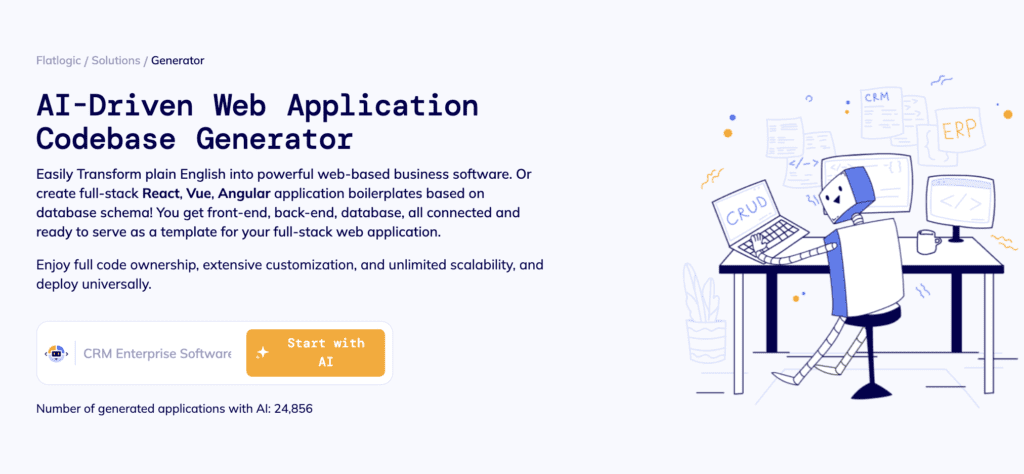
Flatlogic’s AI web app generator is designed to create complex web applications quickly and efficiently. Leveraging AI, it automates much of the coding process, generating high-quality, customizable code based on user specifications. Whether you need an ERP system, CRM, admin panel, or e-commerce platform, Flatlogic’s generator offers a versatile solution tailored to your needs.
Pricing: Pricing varies based on the project scope and specific requirements. Contact Flatlogic for detailed pricing.
Target Audience: Small to medium-sized businesses, startups, and enterprises looking for scalable and customizable web solutions.
Key Features:
- User-friendly interface
- Advanced customization options
- Clean, efficient code generation
- Comprehensive support and documentation
Pros:
- Highly customizable
- Suitable for a wide range of industries
- Excellent support and resources
Cons:
- Pricing can be higher for complex projects
- May require some learning curve for beginners
Bubble
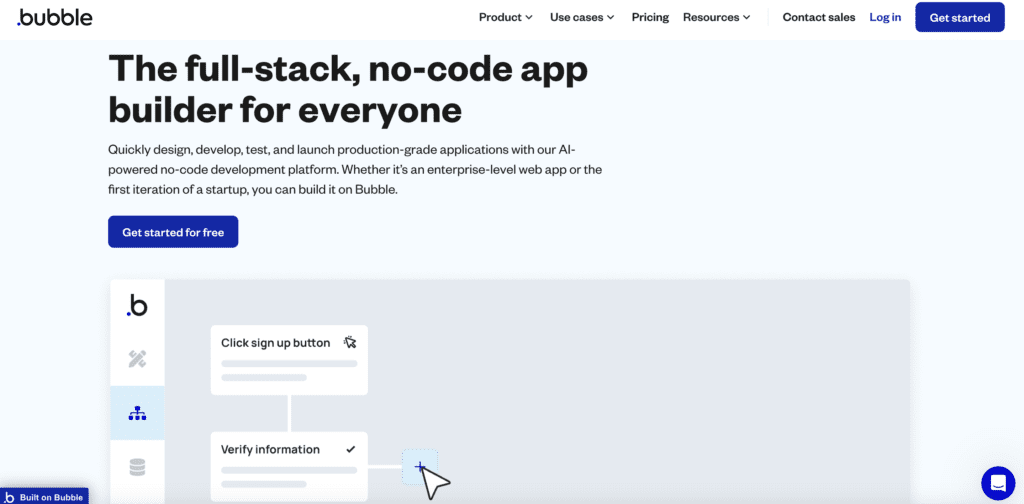
Bubble is a no-code platform that allows users to build web applications visually without writing code. With its intuitive drag-and-drop interface, users can design and customize their applications easily. Bubble provides a range of powerful features including a built-in database, workflows for automating processes, and integration capabilities with third-party services. This makes it an excellent tool for entrepreneurs and small businesses looking to launch their web apps quickly.
Pricing: Free for basic use paid plans start at $25/month.
Target Audience: Entrepreneurs, startups, and small businesses.
Key Features:
- Drag-and-drop interface
- Responsive design
- Built-in database and hosting
- API integrations
Pros:
- Easy to use
- Comprehensive tutorials and community support
- Great for MVPs and prototypes
Cons:
- Limited scalability for complex apps
- Performance can be an issue with high-traffic
OutSystems
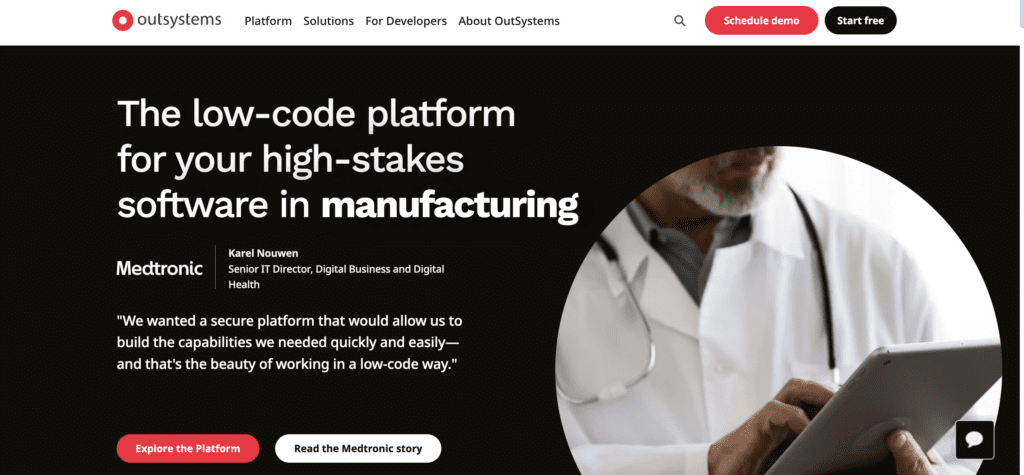
OutSystems is a low-code platform that accelerates the creation of enterprise-grade applications. It provides a full-stack visual development environment, enabling rapid application development and deployment. OutSystems is built to integrate with existing systems, offering robust scalability and security features. This platform is particularly suited for large organizations that require complex, scalable applications with minimal development time.
Pricing: Free for small apps enterprise pricing is available on request.
Target Audience: Enterprises and large organizations.
Key Features:
- Full-stack visual development
- Scalable architecture
- Integration with existing systems
- AI-powered automation
Pros:
- Scalable and robust
- Suitable for complex enterprise applications
- Strong integration capabilities
Cons:
- Steeper learning curve
- Higher pricing for advanced features
Appy Pie
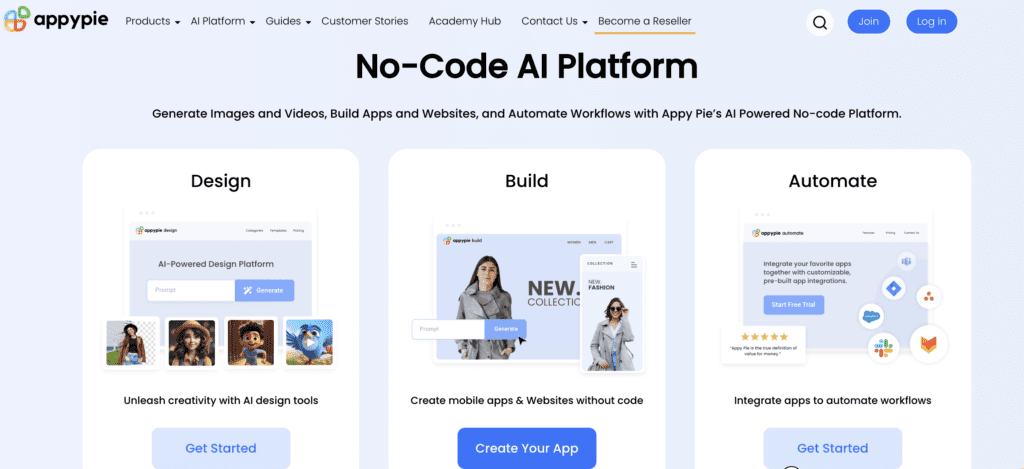
Appy Pie offers a no-code app development platform that allows users to create mobile and web apps easily. The platform is designed to be accessible for users without any coding experience, providing a range of templates and a simple drag-and-drop editor. Appy Pie also supports AI and machine learning integrations, enabling users to create intelligent applications without the need for extensive technical knowledge.
Pricing: Plans start at $18/month.
Target Audience: Small businesses, startups, and individual entrepreneurs.
Key Features:
- No-code development
- Multi-platform support
- AI and machine learning integrations
- Real-time updates and changes
Pros:
- Affordable pricing
- Easy to use for beginners
- Wide range of templates
Cons:
- Limited customization options
- May not be suitable for highly complex apps
Mendix
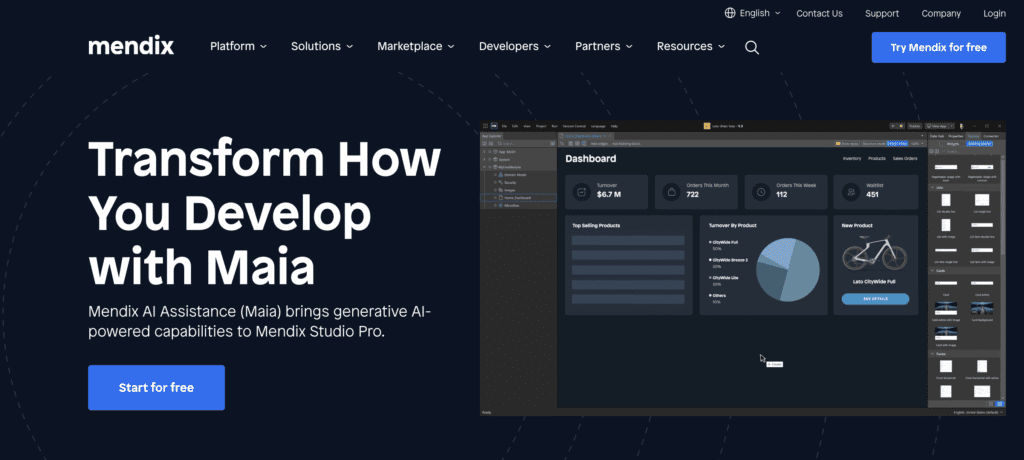
Mendix is a high-productivity application development platform that enables users to create and deploy apps at speed and scale. It offers a collaborative development environment where business and IT can work together seamlessly. Mendix’s AI-assisted development tools help streamline the app creation process, making it ideal for businesses that need to innovate quickly and efficiently.
Pricing: Free tier available professional plans start at $1,875/month.
Target Audience: Large enterprises and developers focused on rapid application development.
Key Features:
- Collaborative development environment
- Full lifecycle support
- AI-assisted development
- Extensive integration capabilities
Pros:
- Robust and scalable
- Excellent for collaborative projects
- Strong support and community
Cons:
- Expensive for smaller businesses
- Requires some technical expertise
Adalo
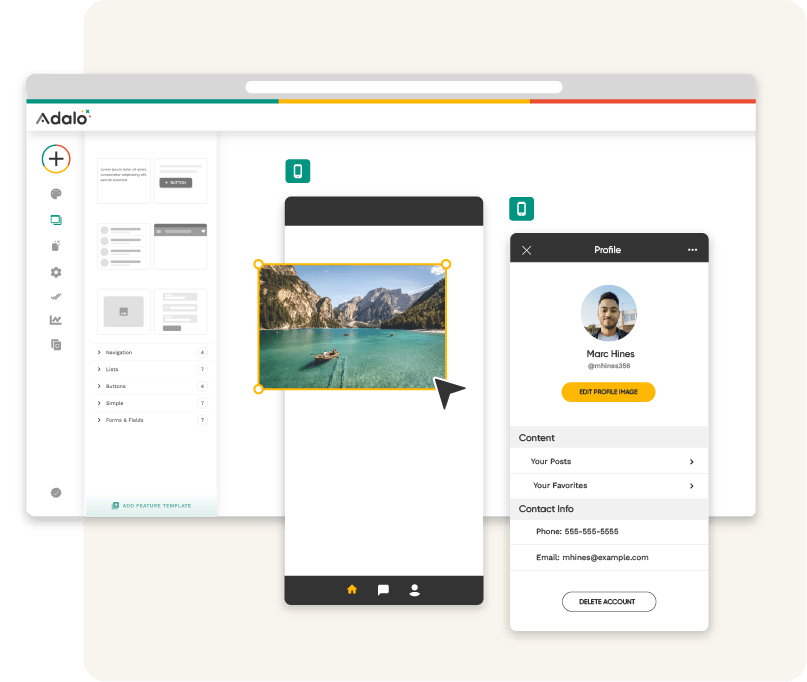
Adalo is a no-code platform that allows users to build mobile and web apps with a visual editor. It simplifies the app creation process with drag-and-drop components, making it accessible to non-technical users. Adalo supports built-in payments, authentication, and custom actions, providing a comprehensive solution for building functional apps quickly and easily.
Pricing: Free tier available paid plans start at $50/month.
Target Audience: Entrepreneurs, small businesses, and non-technical users.
Key Features:
- Drag-and-drop AI app builder
- Built-in payments and authentication
- Custom actions and workflows
- Publishing to app stores
Pros:
- User-friendly
- Great for simple apps and prototypes
- Affordable pricing
Cons:
- Limited functionality for complex applications
- Performance can be an issue with larger user bases
Betty Blocks
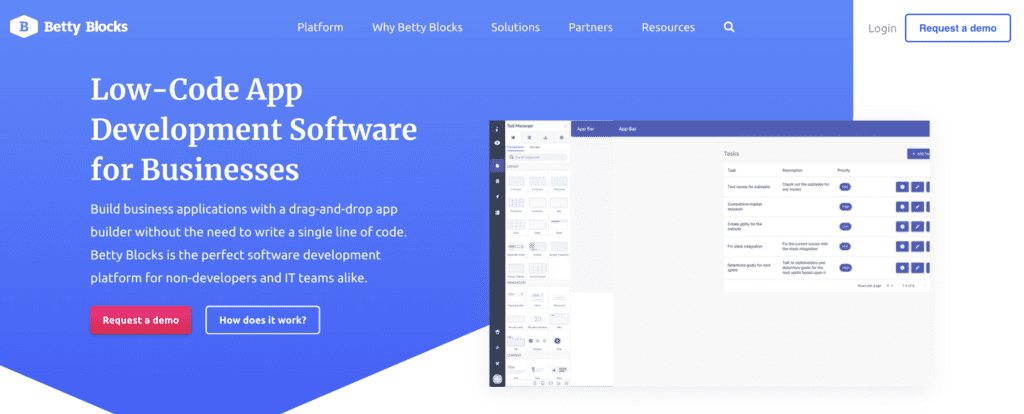
Betty Blocks is a no-code application development platform for rapid deployment. It offers a visual modeling interface and reusable components, enabling users to create and deploy applications without writing code. Betty Blocks supports cloud-based deployment and integrates with various services, making it a versatile tool for businesses of all sizes.
Pricing: Custom pricing based on usage and requirements.
Target Audience: Businesses of all sizes looking to innovate quickly.
Key Features:
- Visual modeling
- Reusable components
- Cloud-based deployment
- Integration with various services
Pros:
- High level of customization
- Suitable for complex apps
- Strong support and training
Cons:
- Can be expensive
- The steeper learning curve for beginners
Glide
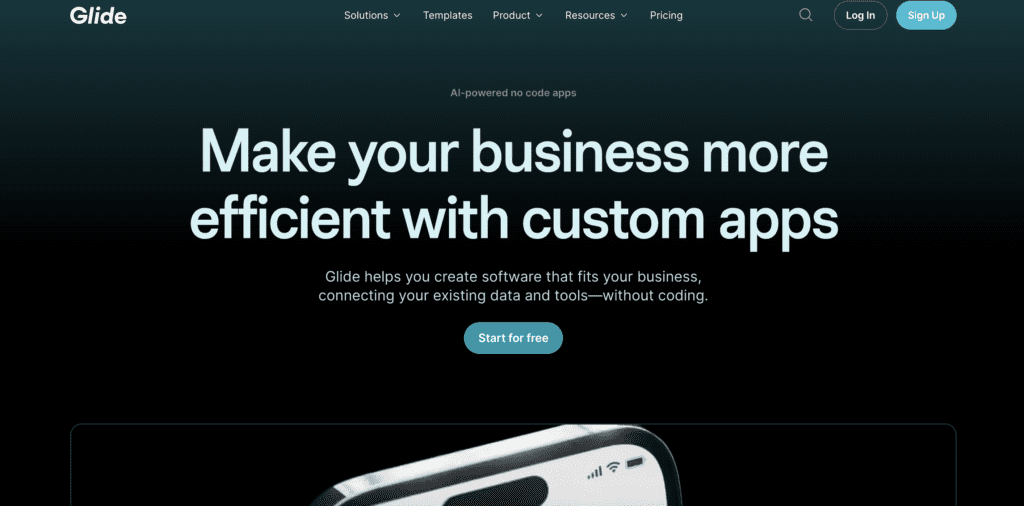
Glide is a platform that transforms spreadsheets into powerful apps without writing code. It allows users to create mobile and web applications by linking their Google Sheets data. Glide’s platform offers real-time data syncing, customizable templates, and easy sharing and collaboration features, making it ideal for small businesses and educators who need to turn data into functional apps quickly.
Pricing: Free tier available paid plans start at $29/month.
Target Audience: Small businesses, educators, and non-technical users.
Key Features:
- Spreadsheet-based app creation
- Real-time data syncing
- Customizable templates
- Easy sharing and collaboration
Pros:
- Extremely easy to use
- Affordable pricing
- Great for simple, data-driven apps
Cons:
- Limited to the functionality of spreadsheets
- Not suitable for highly complex applications
Airtable
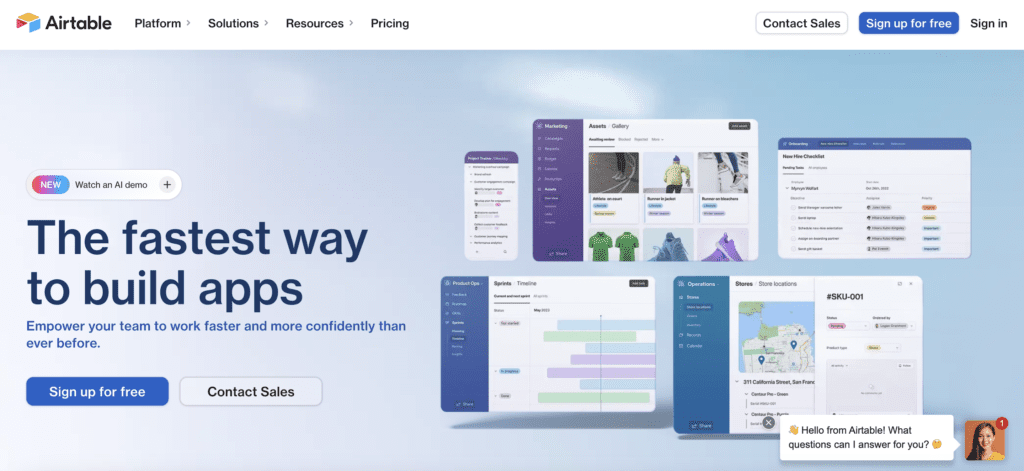
Airtable is a powerful, flexible platform that combines the simplicity of a spreadsheet with the functionality of a database. It allows users to create customized applications without any coding knowledge. Airtable’s versatility makes it suitable for a variety of use cases, from project management to inventory tracking and more. By linking records and automating workflows, Airtable helps streamline complex processes and improve collaboration.
Pricing: Free tier available paid plans start at $10/user/month.
Target Audience: Businesses of all sizes, project managers, and teams looking to enhance productivity.
Key Features:
- Customizable templates
- Rich field types (attachments, links, checkboxes, etc.)
- Automation and integration capabilities
- Real-time collaboration
Pros:
- User-friendly and highly versatile
- Strong automation and integration features
- Excellent for collaboration and project management
Cons:
- Can become complex with extensive data
- Limited advanced functionalities for complex applications
By exploring these top AI web app generators, businesses and developers can find the right tool to meet their specific needs, streamline their development process, and bring their web applications to life more efficiently and cost-effectively.
Conclusion
In summary, traditional web app development is fraught with inefficiencies, such as being time-consuming, resource-intensive, and difficult to scale and maintain. AI web app generators offer a compelling solution by automating the development process, reducing costs, and providing flexibility and scalability. We reviewed some of the top AI web app generators, including Flatlogic, Bubble, OutSystems, Appy Pie, Mendix, Adalo, Betty Blocks, Glide, and Airtable. Each of these platforms brings unique features and advantages, catering to different target audiences and use cases.
If you’re looking to revolutionize your web app development process, consider leveraging the power of AI with Flatlogic. Our platform offers high-quality, customizable code generation that saves you time and resources while providing robust support and documentation. Whether you’re a small business, a startup, or an enterprise, Flatlogic can help you build scalable and efficient web applications tailored to your needs. Visit our website today to learn more about how Flatlogic can transform your development process and help you stay ahead of the competition.
Comments